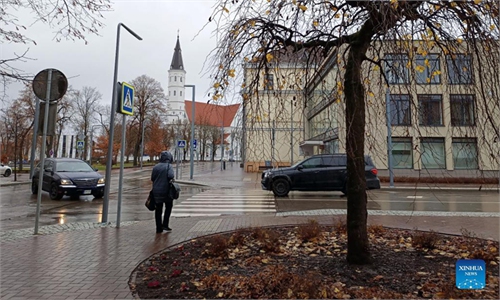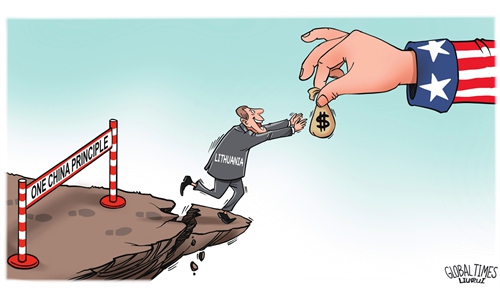IN-DEPTH / IN-DEPTH
GT investigates: From running secret prison for US to torturing refugees, Lithuania has untold dark history
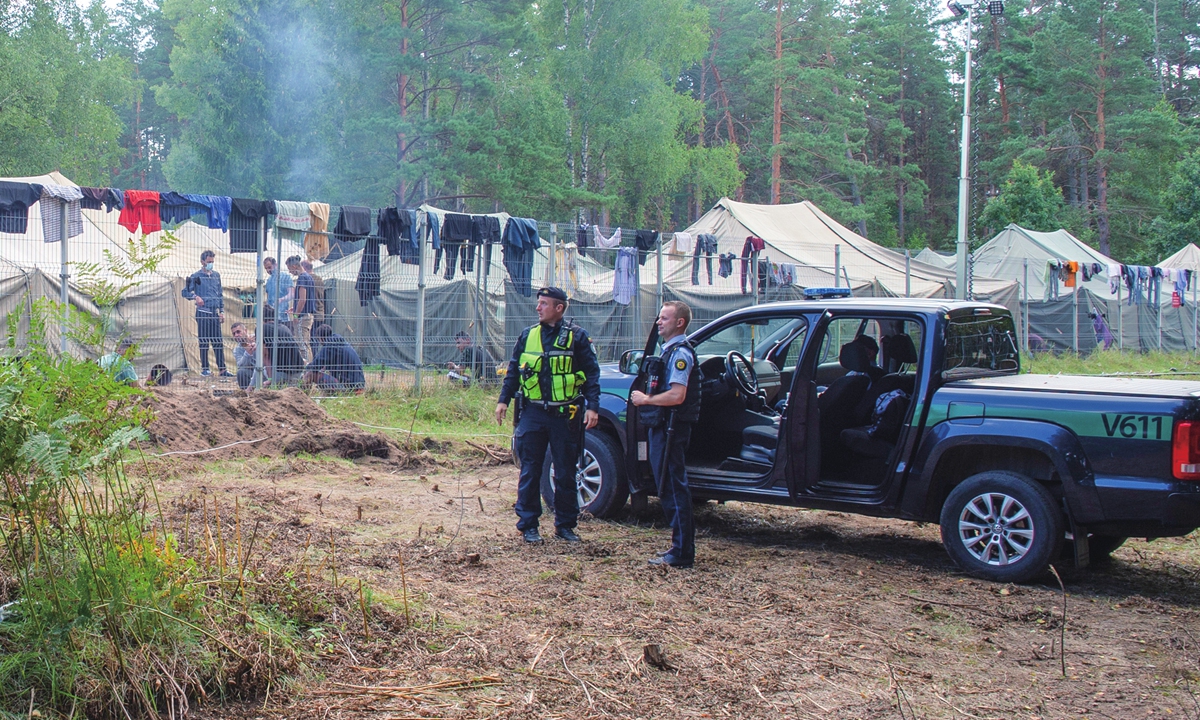
Lithuanian law enforcement officers guard outside a tent camp for migrants detained of illegal border crossing in Alytus near the border with Belarus on August 13, 2021. Photo: VCG
The plight of refugees in Lithuania has recently drawn wide attention from the international community. At the Lithuanian border, military police used tear gas and military dogs to indiscriminately attack refugee children; the refugee detention centers in the country are crowded, dirty, bug-infested and unable to provide even basic necessities.
However, in order to hide the inhumane treatment of refugees from the international community, Lithuanian authorities forced the refugees to stage a fake video along the border, according to media reports.
From abusing women and children to help the US run secret prisons, restricting minorities with discriminatory initiatives, and slaughtering Jews throughout its history, the Global Times found that Lithuania has a well-documented and disgraceful record in the field of human rights.
Experts and observers reached by the Global Times said that Lithuania, a typical supporter of white supremacy and racism, whose long history of crimes against humanity makes it nothing less than a "modern-day Nazi" state.
In order to please the US, Lithuania is willing to be a pawn in the attack against China, but its own hypocritical double standards and the resulting bad deeds in the field of human rights protection cannot be covered up and ignored, experts noted.
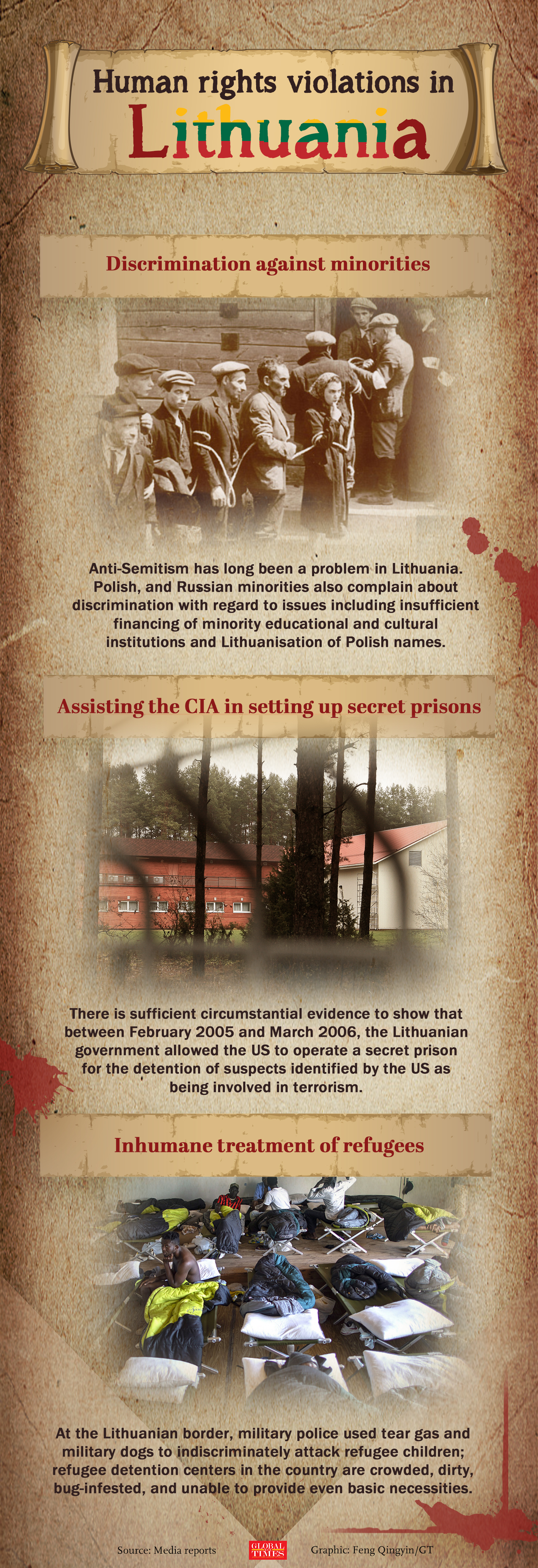
Human rights violations in Lithuania Graphic: Feng Qingyin/GT
Shocking evil
On November 17, the Belarusian state television, Belteleradio, released a video showing Lithuanian soldiers violently evicting migrants from the border, kicking and beating refugees sleeping on the ground, releasing dogs to attack them. At that time, Lithuanian border guards deported 13 men who claimed to have been from Iraq and wanted to seek passage into Western Europe.
In order to reach Western European countries, thousands of refugees from the Middle East recently took a route through Belarus and tried to enter Lithuania, Poland, and other EU countries.
However, faced with record numbers of refugees and migrants, Lithuania has resorted to extreme repression tactics against them.
For example, according to Russian media outlet Sputnik News, the State Border Committee of Belarus on July 19 reported that they found 26 Iraqi citizens who had escaped from Lithuania. Among them were two children and a pregnant woman who needed an ambulance.
The committee then confirmed that refugees in Lithuania were subjected to interrogations, during which they were not given any water. Moreover, the migrants accused the officers of the State Border Guard Service at the Ministry of the Interior of Lithuania of physical assault and battery. They even showed "abrasions and bruises on various parts of their body" due to the violence experienced at the hands of authorities.
However, the Lithuanian Ministry of the Interior claimed that Lithuanian border guards have the right to use force against illegal immigrants. Baltnews cites Lithuanian Interior Minister Agne Bilotaite as saying that the use of "physical and psychological force" can guarantee the "obedience" of immigrants.
Spanish online media Las Republicas had previously reported on migrants expelled from Lithuania at gunpoint, who described how they were beaten, not fed, and forced to give false testimony against Belarusian border guards.
In addition to the brutal deportations, Lithuania's refugee camps are widely criticized for their poor conditions and lack of even the most basic of human rights.
According to Al Jazeera, migrants who have entered Lithuania are being resettled throughout the country. A spokeswoman for the United Nations High Commissioner for Refugees noted, however, that the humanitarian conditions in many refugee reception centers are worrying, especially in terms of drinkable water, sanitation, and medical services.
In August, BelTA, the national news agency of Belarus, quoted a Spanish media source as saying that Lithuania has "created refugee camps in the style of concentration camps.".
The camps, according to Las Republicas, are built in the middle of forested areas where people are exposed to inhumane conditions, including lack of food, being cut off from the outside world, diseases, harsh weather conditions, and humiliation. These refugees may even get shot if they attempt to escape.
On November 19, BelTA revealed that Lithuania had not only been violently driving away defenseless refugees, but also forced them to feature in "choreographed videos" along the border to conceal their inhumane treatment from the international community.
Meanwhile, following the example of the US, Lithuania recently began building Europe's first border wall to keep out migrants from Belarus, Reuters reported
"Most of the people in this camp only want one thing, and that is to be able to live in the European Union." German media outlet Deutsche Welle (DW) remarked, while noting that this group had become political footballs, to be kicked around by various European countries.
However, as opposed to refugees, there is a group of people who may wish they had never lived in Lithuania.
In October, a former CIA officer turned whistleblower against torture called for the release of a suspected terrorist he had captured nearly 20 years earlier. The US Supreme Court for the first time heard a case about a secret detention site and its first detainee, stateless Palestinian Abu Zubayda, who had been suspected to be a member of the Al Qaeda, had been held at black sites run by the CIA in Lithuania and Poland and had been subjected to waterboarding approximately 83 times at a secret site in July 2002.
The Global Times found that as early as May 2018, the European Court of Human Rights (ECHR) had ruled on the case of Abu Zubayda versus Lithuania for assisting the CIA in setting up secret prisons and torture. The ECHR found that there was sufficient circumstantial evidence to show that between February 2005 and March 2006, the Lithuanian government allowed the US to operate a secret prison for the detention of suspects identified by the US as being involved in terrorism.
In November 2019, Mustafa al-Hawsawi, a Saudi citizen previously held at Guantanamo Bay, filed a new lawsuit to the European court against Lithuania, claiming that he had been arbitrarily detained and tortured by the CIA at a secret jail in Lithuania, AFP reported.
According to a report released by the Rendition Project, a London-based research organization focus on the undertaking and publishing of original research into the CIA's torture program, the CIA received approval from the local political leadership before building the black site in Lithuania, after which the CIA offered over one million dollars to its partners to "show appreciation" for their support.
"It turns out that one mistake follows another," said former Lithuanian president Rolandas Paksas. After the ECHR's judgments in 2018 May, Paksas admitted the collusion between the government of Lithuania and the CIA.
Countless oppressed groups
Lithuania's human rights violations against vulnerable and minority groups, including ethnic minorities and women, have also long been a source of concern in the international community.
Observer, for example, noted that anti-Semitism has long been a problem in Lithuania. Lithuania has an inglorious history with its Jewish population. Jewish people have lived in the country for centuries. However, the entire Jewish population was almost wiped out under Nazi occupation. According to the US government, about 90 percent of Lithuania's 250,000 Jews were slaughtered at the hands of Nazi invaders and complicit Lithuanians during World War II. By mid-2019, the size of Jewish community in Lithuania has dramatically reduced to only less than 4,000.
A report this year by the Russian Ministry of Foreign Affairs shows that there has been an increase in manifestations of anti-Semitism in Lithuania. For instance, the Chairperson of the Jewish community in the country, Faina Kukliansky, has received threatening calls, letters, and swastikas among other offensive symbols which were brazenly displayed or depicted in front of Jewish buildings and synagogues.
At the same time, in a 2019 article published in the journal Baltic Region, the authors noted Lithuanian, Polish, and Russian minorities' complaints about discrimination from the Lithuanian government with regard to a number of issues, including "the insufficient financing of minority educational and cultural institutions and Lithuanisation of Polish names."
At a UN Human Rights Committee in July 2018, experts highlighted the Lithuanian civil society's complaints about the discrimination of Polish and Russian minorities.
At the meeting, held to review Lithuania's implementation of the International Covenant on Civil and Political Rights, experts also inquired about the status of a Lithuania's bill that would restrict access to abortion for women.
Lithuanian women's abortion rights were reportedly largely hurt during the pandemic. During its nationwide COVID-19 lockdown between March and June, many local healthcare institutions didn't provide abortion services.
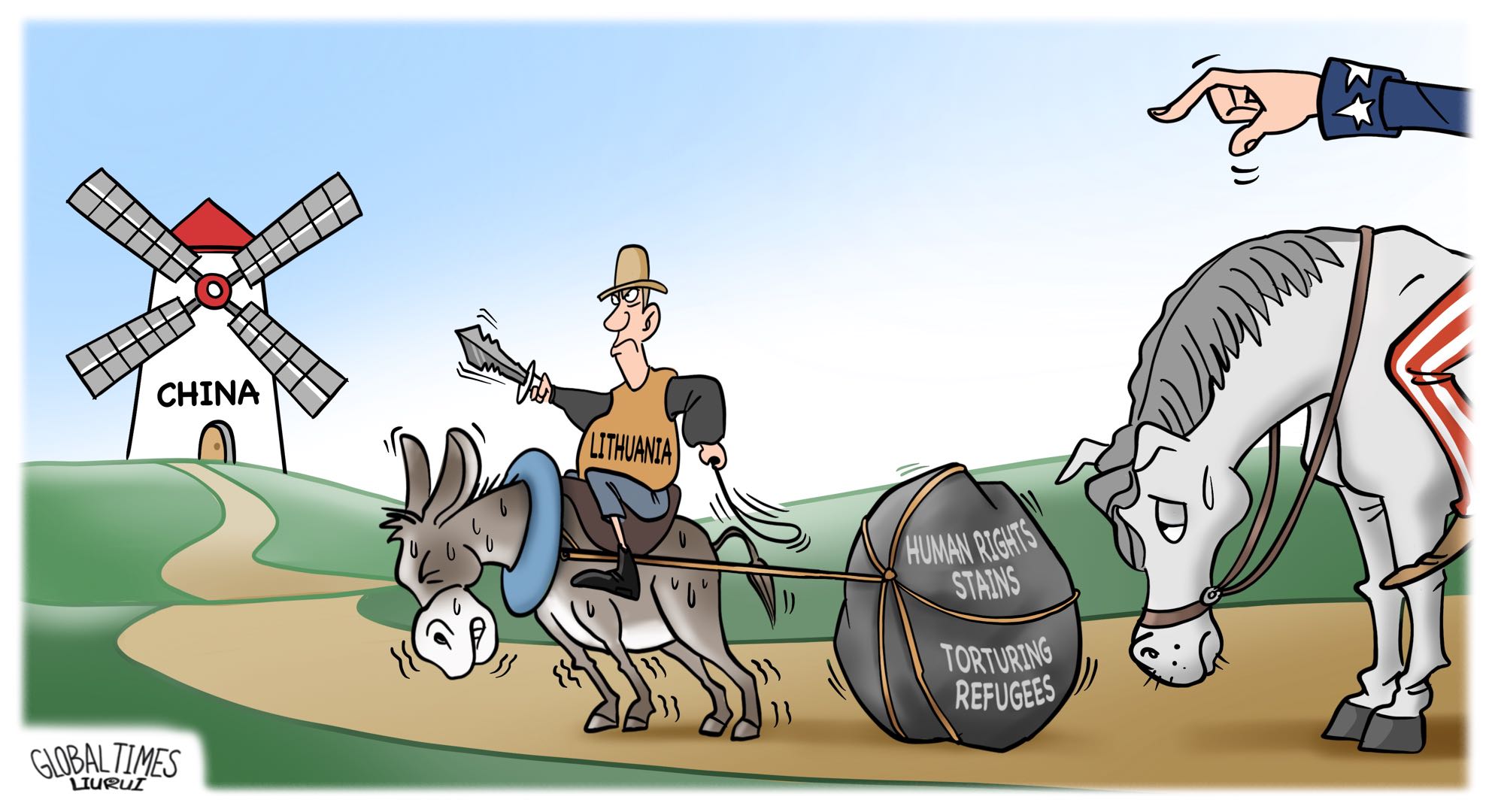
Most loyal servant. Illustration: Liu Rui/Global Times
Hypocritical human rights offenders
"This series of human rights crimes embodies Lithuanian white supremacy and racial puritanism," said Liu Zuokui, a senior research fellow on European Studies at the Chinese Academy of Social Sciences.
In many cases, Lithuania displays a double standard of the understanding and implementation of so-called human rights. It claims to be a human rights defender, but the "human rights" they respect are in fact very limited in scope. Lithuania stands accused of exhibiting exclusionary behavior toward those who are foreign, from different ethnicities or races, or hold different sets of beliefs, Liu told the Global Times.
Liu noted that as a small country with a population of only 3 million, Lithuania historically had great ambitions for power. "When it broke away from the Soviet Union in 1990, it trumpeted its pursuit of democracy, human rights, and freedom, which was just a slogan to fight against the Soviet Union while seeking national independence."
After Lithuania joined the European Union and the North Atlantic Treaty Organization (NATO), it sought to better integrate with the West, which was reflected in its apparent alignment with the values of "human rights" and "democracy" espoused by the West, Liu said. "However, such Western values are hypocritical. They set different matrices of democracy to different objects according to their national interests," he noted.
Lithuanian domestic public opinion in recent years has reflected a more pronounced anti-Russian and anti-communist attitude, and has moved closer to the US ideologically, Gong Jiong, vice president of the University of International Business and Economics Israel Campus commented to the Global Times.
From a geopolitical point of view, Lithuania, which is in close proximity to the Russian enclave of Kaliningrad, also has a stronger sense of insecurity and seeks to tie itself to the US, NATO, and the EU, Gong noted.
Meanwhile, the abuse of detainees and issues with refugees that persist in Lithuania are ultimately caused by the US-led Western world, observers pointed out. It was the US and its NATO forces that disastrously interfered with the Middle East in the name of "anti-terrorism" and ultimately led to the current chaos, they said.
"As President Putin said, the West is responsible for the refugee crisis at the Belarusian-Polish border," said Song Quancheng, head of the Institute of Migration Studies at Shandong University. As the US-led NATO forces created the current humanitarian disaster which resulted in millions of homeless refugees, it should have taken responsibility and taken in the refugees, Song said.
"When overthrowing the legitimate regimes, they usually hold high the banner of humanitarianism; when the refugees really need their humanitarian aid, they just close the door on them," Song told the Global Times.
In an August DW story, Lithuania was described as the EU's border guard, while refugees have become footballs, bounced around from one corner to the next by European countries.
Experts pointed out that in order to please and cooperate with the US, Lithuania constantly criticizes China with the so-called human rights issues in an attempt to increase the power of the US bargaining chip, but the US and Lithuania ignore their own dark history of violating human rights. In the recent refugee crisis at the border, Lithuania's treatment of refugees has been similar to, and in some cases worse than, the US' violent expulsion of Mexican and Haitian migrants in Del Rio, Texas, in September.
"Some countries walk on a tight leash, while others don't. Lithuania is among the first kind. It continues to turn a blind eye to the convention of human rights. You can look for arguments and excuses, but the fact remains. It shouldn't be like that in an independent state," said Paksas.
